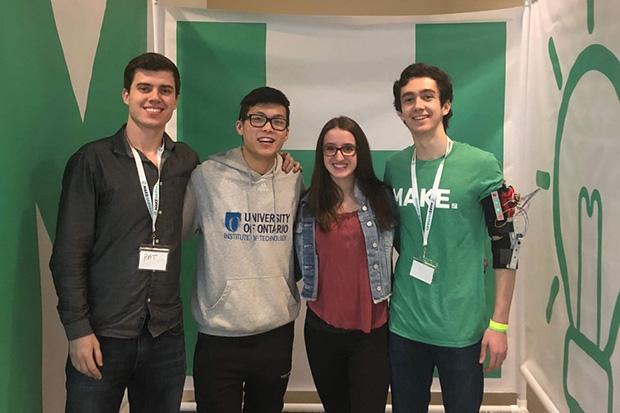Ontario Tech Engineering students win big at Harvard competition
Invent therapeutic arm brace that speeds recovery for injured workers and astronauts returning from space
May 31, 2019

In his 2013 cover of David Bowie’s 1969 hit song ‘Space Oddity’, Chris Hadfield, Canadian astronaut and former commander of the International Space Station, made floating around gravity-free look like a whole lot of fun.
But in reality, constant weightlessness leads to serious physical challenges over long periods of time. In space, astronauts lose muscle strength and bone density because their bodies are not working against the downward pull of Earth’s gravity. Although exercising for two hours a day while in space helps offset some degeneration, astronauts must still undergo many months of rehabilitation once they return to Earth, and may eventually require surgery to correct hip and vertebra fractures caused by bone loss.
Astronauts are not the only ones who face lengthy rehabilitation times as a result of their job: many injuries that occur in manufacturing plants also require extended time off work and intensive physical therapy, costing employers and employees time and money.
Ontario Tech University Manufacturing Engineering student Patrick Poplawski, along with Mechatronics Engineering student Mankin Ho, have developed a unique solution to help fast-track recovery for returning astronauts or injured workers: a smart, wearable arm brace that emits low-frequency vibrations near the elbow joint. The idea behind their invention, dubbed Vibrace, is based on National Aeronautics and Space Administration (NASA)-funded studies that suggest daily exposure to light vibrations could prevent muscle and bone degeneration in astronauts. The same type of therapy shows promise in treating workplace-related injuries.
Remarkably, the fourth-year students invented Vibrace in only 24 hours, while participating in MakeHarvard, a hackathon (‘invention marathon’) hosted by Harvard University in Cambridge, Massachusetts. Their device, developed in collaboration with two Harvard students, received ‘major league’ recognition in an Ivy League competition, netting second place in MakeHarvard’s Best Overall category.
The competition experience

At MakeHarvard, participants had access to rapid-prototyping technologies such as 3D printers, laser cutters and design software.
Poplawski and Ho's team began by constructing a brace made of fabric and plastic, attaching a potentiometer (an instrument used to regulate voltage) to the brace using metal linkages and gears, and calibrating it to detect arm movement. Using Velcro and stitching, they attached plastic hinges to the fabric of the armband to allow for real-time monitoring of the arm’s movements and joint extensions. The collected data can be analyzed to refine the wearer’s movement and change work habits, which could help prevent injury in the future.
The students had to overcome software and hardware malfunctions while also keeping an eye on the clock. They also had to think on their feet and change tactics when they realized they might run out of time before getting their invention to work.
“This competition allowed us to use the mechanical, electrical and software theories we learned in the classroom in a practical way,” says Poplawski. “It helped us strengthen our knowledge on subjects like electrical circuits, CAD (computer-assisted design), and software coding. It also gave us something to put on our resumés to showcase to potential employers: not only technical skills, but also soft skills like leadership, team building, presenting and communication.”
Participating in hackathons increases international recognition for universities. MakeHarvard is one of more than 200 yearly competitions across North America and Europe hosted by Major League Hacking (MLH), a student hackathon league. At each official MLH event, students earn points for their respective schools based on event participation (for completing their hack), as well as the merit of their team’s project. At the end of the season (which runs from August to July), the school with the most points receives the MLH trophy along with recognition as that season’s MLH Champion.
“Earning MLH points helps put Ontario Tech University on the map and build the reputation of its Engineering program,” says Poplawski. “It exposes prospective students, employers and recruiters to the amazing talent we are building within the university, and opens the doors to more funding for academic programs.”
Interested in participating in a hackathon? Check out some upcoming in-person and online events.



